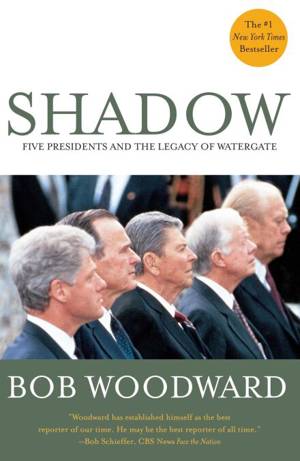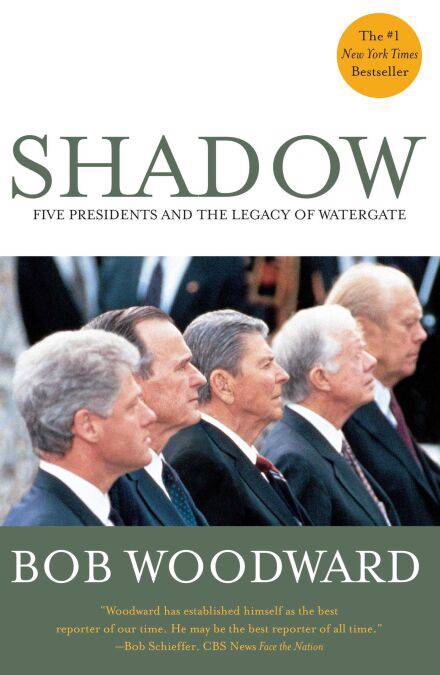
- Retrait gratuit dans votre magasin Club
- 7.000.000 titres dans notre catalogue
- Payer en toute sécurité
- Toujours un magasin près de chez vous
- Retrait gratuit dans votre magasin Club
- 7.000.0000 titres dans notre catalogue
- Payer en toute sécurité
- Toujours un magasin près de chez vous
19,00 €
+ 19 points
Format
Description
Twenty-five years ago, after Richard Nixon resigned the presidency, Gerald Ford promised a return to normalcy. "My fellow Americans, our long national nightmare is over," President Ford declared.
But it was not. The Watergate scandal, and the remedies against future abuses of power, would have an enduring impact on presidents and the country. In Shadow, Bob Woodward takes us deep into the administrations of Ford, Carter, Reagan, Bush and Clinton to describe how each discovered that the presidency was forever altered. With special emphasis on the human toll, Woodward shows the consequences of the new ethics laws, and the emboldened Congress and media. Powerful investigations increasingly stripped away the privacy and protections once expected by the nation's chief executive.
Using presidential documents, diaries, prosecutorial records and hundreds of interviews with firsthand witnesses, Woodward chronicles how all five men failed first to understand and then to manage the inquisitorial environment.
"The mood was mean," Gerald Ford says. Woodward explains how Ford believed he had been offered a deal to pardon Nixon, then clumsily rejected it and later withheld all the details from Congress and the public, leaving lasting suspicions that compromised his years in the White House.
Jimmy Carter used Watergate to win an election, and then watched in bewilderment as the rules of strict accountability engulfed his budget director, Bert Lance, and challenged his own credibility. From his public pronouncements to the Iranian hostage crisis, Carter never found the decisive, healing style of leadership the first elected post-Watergate president had promised.
Woodward also provides the first behind-the-scenes account of how President Reagan and a special team of more than 60 attorneys and archivists beat Iran-contra. They turned the Reagan White House and United States intelligence agencies upside down investigating the president with orders to disclose any incriminating information they found. A fresh portrait of an engaged Reagan emerges as he realizes his presidency is in peril and attempts to prove his innocence.
In Shadow, a bitter and disoriented President Bush routinely pours out his anger at the permanent scandal culture to his personal diary as a dozen investigations touch some of those closest to him. At one point, Bush pounds a plastic mallet on his Oval Office desk because of the continuing investigation of Iran-contra Independent Counsel Lawrence Walsh. "Take that, Walsh!" he shouts. "I'd like to get rid of this guy." Woodward also reveals why Bush avoided telling one of the remaining secrets of the Gulf War.
The second half of Shadow focuses on President Clinton's scandals. Woodward shows how and why Independent Counsel Kenneth Starr's investigation became a state of permanent war with the Clintons. He reveals who Clinton really feared in the Paula Jones case, and the behind-the-scenes maneuvering and ruthless, cynical legal strategies to protect the Clintons. Shadow also describes how impeachment affected Clinton's war decisions and scarred his life, his marriage and his presidency. "How can I go on?" First Lady Hillary Clinton asked in 1996, when she was under scrutiny by Starr and the media, two years before the Lewinsky scandal broke. "How can I?"
Shadow is an authoritative, unsettling narrative of the modern, beleaguered presidency.
But it was not. The Watergate scandal, and the remedies against future abuses of power, would have an enduring impact on presidents and the country. In Shadow, Bob Woodward takes us deep into the administrations of Ford, Carter, Reagan, Bush and Clinton to describe how each discovered that the presidency was forever altered. With special emphasis on the human toll, Woodward shows the consequences of the new ethics laws, and the emboldened Congress and media. Powerful investigations increasingly stripped away the privacy and protections once expected by the nation's chief executive.
Using presidential documents, diaries, prosecutorial records and hundreds of interviews with firsthand witnesses, Woodward chronicles how all five men failed first to understand and then to manage the inquisitorial environment.
"The mood was mean," Gerald Ford says. Woodward explains how Ford believed he had been offered a deal to pardon Nixon, then clumsily rejected it and later withheld all the details from Congress and the public, leaving lasting suspicions that compromised his years in the White House.
Jimmy Carter used Watergate to win an election, and then watched in bewilderment as the rules of strict accountability engulfed his budget director, Bert Lance, and challenged his own credibility. From his public pronouncements to the Iranian hostage crisis, Carter never found the decisive, healing style of leadership the first elected post-Watergate president had promised.
Woodward also provides the first behind-the-scenes account of how President Reagan and a special team of more than 60 attorneys and archivists beat Iran-contra. They turned the Reagan White House and United States intelligence agencies upside down investigating the president with orders to disclose any incriminating information they found. A fresh portrait of an engaged Reagan emerges as he realizes his presidency is in peril and attempts to prove his innocence.
In Shadow, a bitter and disoriented President Bush routinely pours out his anger at the permanent scandal culture to his personal diary as a dozen investigations touch some of those closest to him. At one point, Bush pounds a plastic mallet on his Oval Office desk because of the continuing investigation of Iran-contra Independent Counsel Lawrence Walsh. "Take that, Walsh!" he shouts. "I'd like to get rid of this guy." Woodward also reveals why Bush avoided telling one of the remaining secrets of the Gulf War.
The second half of Shadow focuses on President Clinton's scandals. Woodward shows how and why Independent Counsel Kenneth Starr's investigation became a state of permanent war with the Clintons. He reveals who Clinton really feared in the Paula Jones case, and the behind-the-scenes maneuvering and ruthless, cynical legal strategies to protect the Clintons. Shadow also describes how impeachment affected Clinton's war decisions and scarred his life, his marriage and his presidency. "How can I go on?" First Lady Hillary Clinton asked in 1996, when she was under scrutiny by Starr and the media, two years before the Lewinsky scandal broke. "How can I?"
Shadow is an authoritative, unsettling narrative of the modern, beleaguered presidency.
Spécifications
Parties prenantes
- Auteur(s) :
- Editeur:
Contenu
- Nombre de pages :
- 608
- Langue:
- Anglais
Caractéristiques
- EAN:
- 9780684869223
- Date de parution :
- 15-06-99
- Format:
- Ebook
- Protection digitale:
- Adobe DRM
- Format numérique:
- ePub

Les avis
Nous publions uniquement les avis qui respectent les conditions requises. Consultez nos conditions pour les avis.






